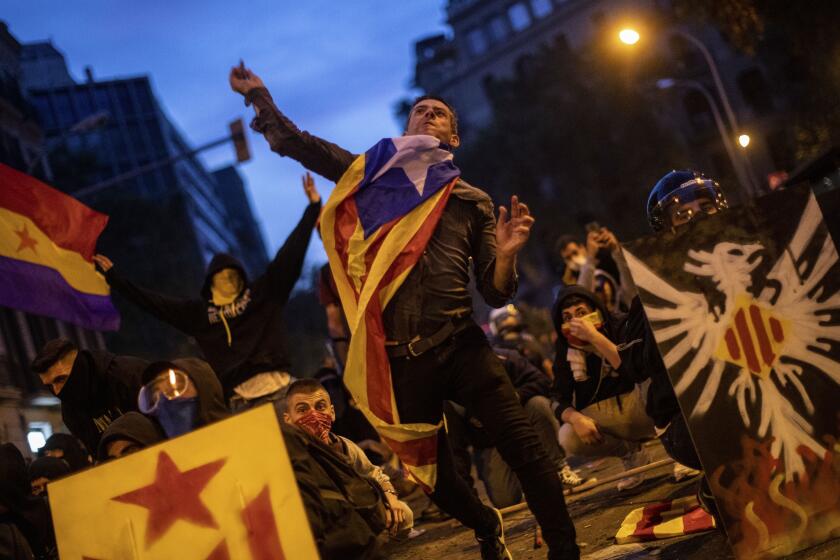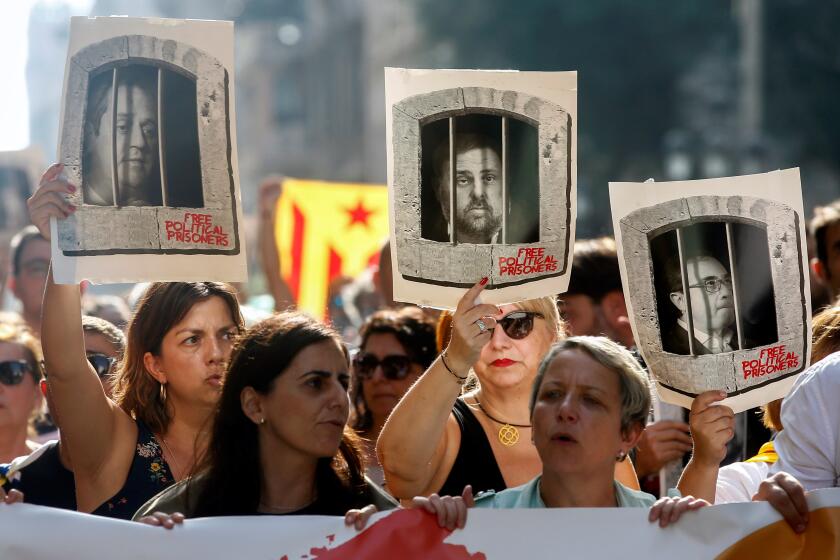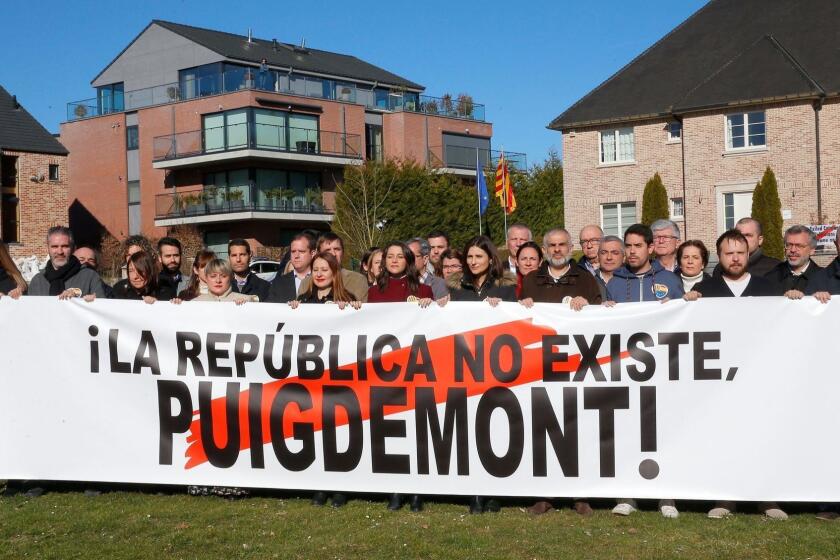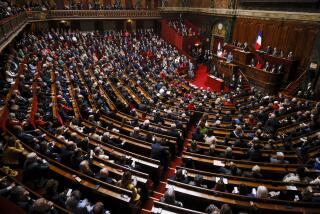Spanish parliament approves controversial amnesty for Catalan separatists

- Share via
BARCELONA, Spain — Spain’s Parliament approved on Thursday a controversial amnesty bill aimed at forgiving crimes — both proved and alleged — committed by Catalan separatists during a chaotic attempt to hold an independence referendum in the region six years ago.
Prime Minister Pedro Sánchez has promoted the amnesty as a way to move past the 2017 secession attempt by the then-leaders of Catalonia, a northeastern region around Barcelona where many speak the local Catalan language as well as Spanish.
However, the bill has also met opposition from millions of Spaniards who believe that the people who provoked one of Spain’s biggest political crises should face charges including embezzlement and promoting public disorder.
Sánchez has already pardoned nine jailed Catalan independence leaders, a move that helped heal wounds at little political cost. But the amnesty is proving to be much more divisive.
The bill was passed by a margin of 178 to 172 in the 350-seat lower house of Parliament in Madrid.
Thousands of ordinary citizens got into legal trouble for their parts in Catalonia’s illegal independence bid that brought Spain to the brink of rupture.
The secession crisis erupted in 2017, when a regional administration led by Carles Puigdemont staged a referendum on independence, defying orders from the national government and a ruling from Spain’s top court that doing so violated the Constitution. Madrid sent in police in an attempt to stop the referendum, who were opposed by protests that turned violent.
The Catalan Parliament declared independence Oct. 27 that year, but it failed to garner any international support. Puigdemont and several other senior officials later fled Spain.
Many people in Catalonia face the threat of prosecutions related to the referendum or protests, and Puigdemont and other leaders remain abroad.
Recent court investigations have accused the former regional president of terrorism for allegedly masterminding massive protests that clashed violently with police and closed roads, train lines and the Barcelona airport in 2019.
Sánchez agreed to the amnesty to secure the backing of two Catalan separatist parties, after an inconclusive national election last July turned them into kingmakers.
The Spanish court sentenced ex-Catalan regional vice president Oriol Junqueras to 13 years after Catalonia’s attempt to break away from Spain.
The conservative opposition accuses Sánchez of selling out the rule of law in exchange for another term in the Moncloa Palace and has organized major street protests during recent months.
Socialist Party parliamentary spokesman Patxi López defended the bill Thursday as a move to seek a page-turning “reconciliation” with Catalonia.
The opposition Popular Party leader Alberto Núñez Feijóo hit back, saying that “this is not reconciliation but submission.”
It was not clear whether the deal will add stability to Sánchez’s minority government: Junts, a separatist party led by Puigdemont, said that Sánchez owed them the amnesty for having supported his bid to stay in power, and that their potential backing of his policies would depend on what they can get in return.
The bill still faces procedural steps before becoming law. The Senate, which has a conservative majority, is expected to reject it, which would mean that Parliament’s lower house will have to vote for it a second time to push it through.
The talks seemed like the most realistic opportunity in some time for greater autonomy of the region, which voted for independence in a 2017 referendum that Spain considered illegal.
Sánchez’s party has had a very hard time crafting a bill that satisfies the separatists and which will surely be highly scrutinized by the courts. Parliament rejected an earlier version of the bill in late January when Junts said it didn’t do enough to protect Puigdemont. The bill then went back to a parliamentary committee, where it was tweaked to suit Junts’ needs.
Puigdemont now lives in Belgium, where he has become a European Parliament member. A fugitive from Spanish justice, he calls himself a political exile.
Thursday’s vote comes a day after Catalonia’s regional leader called early elections. That decision added more uncertainty to Spanish politics and led to Sánchez canceling plans for a 2024 budget because of the difficulty he would have had trying to get the support of the two separatist parties during election time.
Oriol Bartomeus, a professor of political science of the Autonomous University of Barcelona, said Sánchez’s government remains weak despite having cleared the amnesty hurdle. But the snap election in Catalonia at least buys him some time.
The Catalans come in droves, carrying separatist flags and cameras to photograph the nondescript brick house on a quiet road in the town where Napoleon suffered his final defeat more than two centuries ago.
“The good thing for Sánchez is that instead of now having to face some extremely difficult negotiations over a budget, he can get a breather if the Socialists do well in the Catalan elections,” Bartomeus told the Associated Press.
Spain granted a sweeping amnesty during its transition back to democracy after the death of dictator Francisco Franco in 1975. But experts are divided over the constitutionality of an amnesty for the Catalan separatists. Critics say it violates the principle of equality among Spaniards by favoring those of one region.
The government says the amnesty could help hundreds of people, while the pro-independence Catalan organization Omnium Cultural says it should benefit some 4,400, mostly minor officials and ordinary citizens who either helped to organize the referendum or participated in protests.
The application of the amnesty will be decided by the courts on a case-by-case basis.
Wilson writes for the Associated Press. AP writer Ciarán Giles in Madrid contributed to this report.
More to Read
Sign up for Essential California
The most important California stories and recommendations in your inbox every morning.
You may occasionally receive promotional content from the Los Angeles Times.














